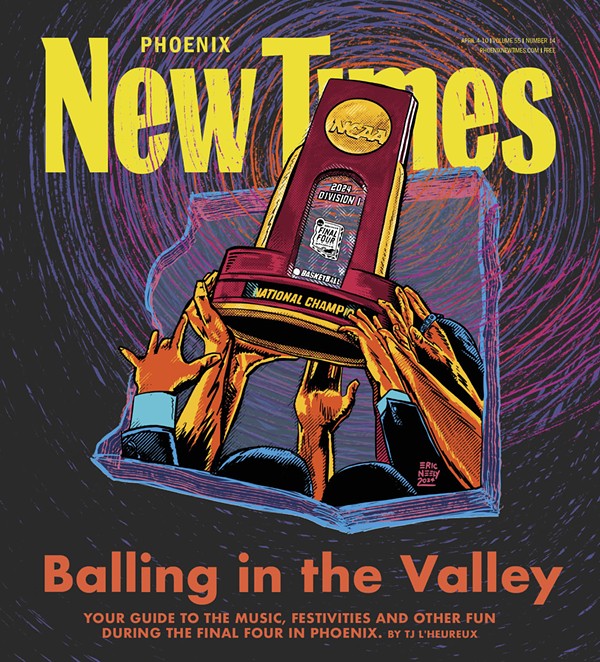Two drivers stopped at a red light one night in April 2007.
One driver was drunk — and not just a little drunk. Jonathan Hernandez was a convicted felon on probation, with enough alcohol in his blood to qualify for an extreme DUI.
The other driver, 19-year-old Jacob Ritter-Clark, had never gotten so much as a speeding ticket. He was sober.
I know you think you know where this is going. Two drivers collided, and their lives will never been the same. Blah blah blah.
But the two drivers didn't collide.
Both cars took off at the light, but Hernandez took off much faster. He gunned his Saturn and cut in front of Ritter-Clark — then lost control, flipping his car and pinning his passenger between the open sunroof and the bloody pavement.
Tests would later show Hernandez had been going at least 88 miles per hour.
But though Ritter-Clark's car never even touched the speeding drunk's, the cliché is still right on one level: In the wake of the accident, both drivers' lives have been irrevocably altered.
Jonathan Hernandez is in prison. No surprise there. But here is the unexpected part: Jacob Ritter-Clark might end up with an even longer sentence.
Ritter-Clark, the sober driver who managed to avoid crashing into the out-of-control drunk felon, pulled over immediately to call 911. Thanks to that act of kindness, he's now facing two felony counts — and a presumptive sentence of 7½ years in prison.
If you've learned about the courts by watching Law & Order, you might imagine that the wheels of justice move quickly. But this is true only in one sense. The initial review of a collision, or a simple assault, is often speedy as hell. Arrests are made. Charges are filed.
After that, the wheels can grind interminably. You won't plead guilty to a lesser charge? Prepare to attend pre-trial hearing after pre-trial hearing. Prepare for trial dates that come and go, with no trial in sight.
That's because, typically, no one wants a trial. Trials are expensive — and bring no guarantee of justice. If you're guilty of anything, you're much better off cutting a deal, getting some charges thrown out, and throwing yourself on the judge's mercy.
Judges know that, prosecutors know that, defense lawyers know that.
Jonathan Hernandez, the kid who caused the accident by driving drunk and speeding, surely knows that, too.
Hernandez, as they say, was "known" to the system — just 23, he'd already racked up five domestic violence convictions, one of them a felony that he was still on probation for. (Two years before the crash, records show that he hid in the bushes, ambushed an ex-girlfriend, and choked her in front of their 2-year-old son.) On probation, he'd managed to total a car by wrapping it around an electric pole, tested positive for cocaine use, and failed to show up for further testing — all without being sent to prison.
Like any good repeat offender, Hernandez knows the game. He took the deal on the table: five years in prison, plus three years probation.
It's Jacob Ritter-Clark who's holding things up. He keeps protesting that he's innocent.
The Mesa police decided that Jacob Ritter-Clark and Jonathan Hernandez were drag racing. That's illegal. Following Mesa PD's recommendation, the Maricopa County Attorney charged both with aggravated assault and endangerment.
Hernandez was guilty, clearly. But it's only after I read the police report that I realized how thin the evidence is against Ritter-Clark.
In fact, if Ritter-Clark hadn't thought of himself as an innocent bystander and immediately returned to the upside-down Saturn to call 911, I can't imagine he'd be facing charges today.
That night, Ritter-Clark and his passenger each told police the exact same story: Hernandez and his buddy pulled up next to them at the stoplight at Greenfield and Main and asked them to drag race. They refused, and the next thing they knew, the light turned green and Hernandez's Saturn cut in front of them — then skidded into the curb, flipped, and thudded to a halt only because it smashed into a Mexican restaurant.
Because Ritter-Clark's car never hit anything, because there were no skid marks or physical evidence left by his vehicle, there is no way that anyone can know how fast he was going that night. But two witnesses told police that Ritter-Clark was driving way over the speed limit — and the cops, after all, had heard from Ritter-Clark himself that he'd been challenged to a drag race.
So, when they saw that he'd bought fancy black rims for his Toyota Corolla, that he had put a Toyota sticker on its hood, and was tricking out the exhaust system, the cops must have thought they had a speed freak.
"The officer was talking about how he likes going fast on his 'crotch rocket,'" Ritter-Clark recalls. He says he asked whether Ritter-Clark had ever been to the raceway.
No, Ritter-Clark answered, truthfully. But he had friends who went and, someday, he'd like to go, he told the cop.
It was only months later, when Ritter-Clark got a summons in the mail, that he realized he was in any trouble.
He was so confused that he actually went down to the Mesa Police Department and looked at a copy of the police report. It was then that he realized he'd become a criminal defendant in the very case in which he had turned around to call 911.
And never mind what you heard in school about "innocent until proven guilty." From that point, it was up to Jacob Ritter-Clark to prove himself innocent.
Now, that wouldn't normally be so difficult. To show that Ritter-Clark is guilty of aggravated assault, prosecutors don't have to show only that he was speeding, or even drag racing. They'd have to show that he recklessly caused the accident — or used his vehicle as a "dangerous instrument." Both seem pretty ludicrous in light of the fact that he never touched the other car and that the other driver was drunk and ripping through traffic at nearly 90 miles per hour.
Unfortunately, the person who ought to be able to help Ritter-Clark fight the charges, and take the case to trial, has been kicked off the case.
Marie Clark, Jacob's mother, tells me that her family refinanced their house in order to hire Chuck Franklin, a Scottsdale attorney. Franklin is a smart, experienced lawyer — although he's arguably best known for the giant RV that tools around the Valley advertising his services.
Franklin, clearly, thought Ritter-Clark's protestations of innocence had some merit. He asked for a "complex case" designation, estimating that his firm would hire as many as five experts and do 20 witness interviews.
Then came the complication. Franklin's small firm had just hired a young lawyer from the County Attorney's Office. And, though no one realized it at first, as a prosecutor, that lawyer had visited the crash scene and had been in a meeting where the Ritter-Clark case was discussed. Because of that, the County Attorney's Office asked the judge to disqualify Franklin's entire firm.
The judge agreed. And though Franklin fought the ruling, appealing all the way to the Arizona Supreme Court, the judge's decision stood.
By that point, Ritter-Clark's family was low on money. They'd paid Franklin $11,000, and even though he's refunded more than half of it, the lawyers they consulted were not willing to take the case to trial for less than $12,500.
Jacob Ritter-Clark was working as a contract employee at TRW, but his contract wasn't renewed. His car has been repossessed — and he still owes $12,500 on his car loan.
He was assigned a public defender.
The family liked Franklin. They trusted him.
They do not feel the same way about Matthew Smiley. An attorney contracted with the Office of Public Defense Services, Smiley has officially been part of the case since October but didn't even get a copy of the police report until last week. He's never so much as called his client. Until I gave it to them, Ritter-Clark's family didn't even have Smiley's phone number.
(Smiley declined comment, saying he needs to sit down with his client before he can say anything about the case.)
If Jacob Ritter-Clark wants to make a deal, he'll have to plead guilty to a felony. If he refuses, and he's found guilty of aggravated assault at a trial, the minimum sentence he could receive is five years of hard time.
Marie Clark is so worried that she starts tearing up just talking about her son. She's had to go on anti-anxiety medication for the first time in her life, she confides.
"We can't have our lawyer," Clark says. "So now what do we do? And if my son goes to prison for something he didn't do, what am I supposed to do?"
On June 26, Jacob Ritter-Clark is at yet another court hearing. He's dressed carefully, in a black button-up shirt. His mom is there, and his dad, and his fiancée, Kadi Horvath, who is four months pregnant.
He wants to make a good impression. He hopes someone will notice a man who is loved. Someone expecting his first child. Someone whose mother is worried sick.
But no one notices.
The judge is scheduling other cases. The prosecutors have a ton of work and need to keep things moving.
And Jacob Clark-Ritter's lawyer is nowhere to be seen.
"He called me for the first time this morning," says Marie Clark. Her eyes are anxious. "He asked if he was still representing us."
Superior Court Judge David Udall calls the court to order at 9 a.m., and most of the other lawyers are ready to go. Trial dates are scheduled. Guilty pleas are made.
Everything is moving along nicely, except Matthew Smiley is still missing.
The prosecutor is not happy about it. "Have you seen Smiley this morning?" he quizzes one of the public defenders at, oh, roughly 9:45 a.m.
"Smiley?" asks the public defender.
"He's in your office," the prosecutor says, impatiently.
The public defender turns to one of his colleagues. "Who's Smiley?" he asks.
The other one shrugs: "I have no idea."
By the time Smiley finally shows up, more than an hour late, all other scheduling is long done. Judge Udall has retreated to his chambers, and the prosecutors are steaming.
So Smiley doesn't have time to so much as say "hi" to his client before Judge Udall reappears, eager to finish scheduling matters.
Because Smiley has never really talked to his client, he schedules the next hearing smack in the middle of Ritter-Clark's honeymoon.
This is what passes for justice in Maricopa County. It's hard to sit here, and watch the process grind on, and not want to stand up and shout that something has to give.
Marie Clark says her son came to her with tears in his eyes. He is, after all, about to get married, with a baby on the way.
"Mom, if I end up in jail, will you take care of my family?" Jacob asked.
What can she say? What can anyone say?
And here's the craziest part.
The "victim," the guy Jacob Ritter-Clark supposedly assaulted, is himself a convicted felon. Jonathan Belarde had been found guilty of theft and aggravated assault — and was released from prison just one month before he climbed into Jonathan Hernandez's car on that fateful night. Police records show that he, like his driver, had been drinking. His injuries were not life-threatening, but they were pretty serious.
After the accident, Belarde violated parole and ended up in prison again. He died there in September 2007, according to state records. (Prison records say he died of natural causes; corrections officials provided no further information.)
This is the "victim" whom prosecutors are supposedly protecting by prosecuting Jacob Ritter-Clark. A dead thug.
What a county.










